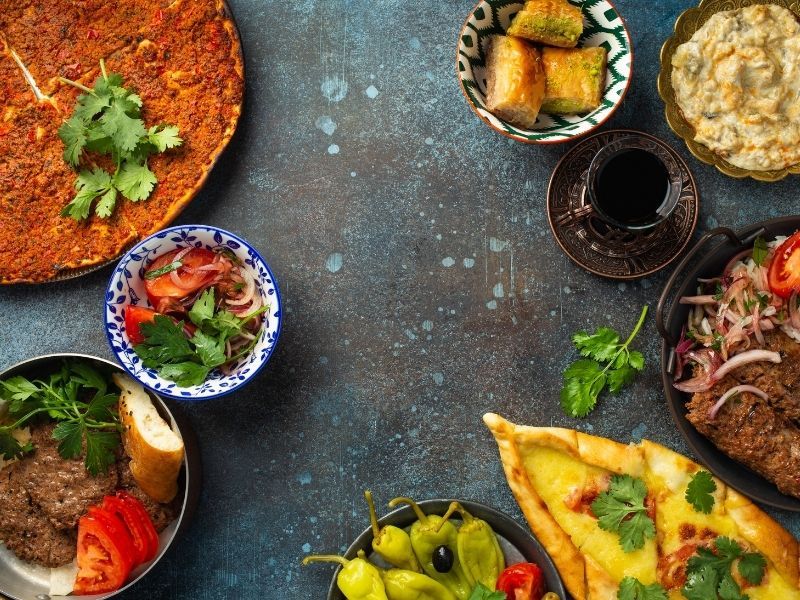Guide to Popular Turkish Food
Guide in Türkiye

Turkish cuisine is a delightful fusion of flavors, textures, and aromas that reflects the country’s rich cultural heritage and geographical diversity. With influences from the Mediterranean, the Middle East, and Central Asia, each dish is a celebration of fresh ingredients and time-honored cooking techniques. Whether you’re a food enthusiast or simply curious about new tastes, Turkish food offers something for everyone.
In this blog, we will take you on a culinary journey through some of Türkiye's most popular dishes. From the iconic kebabs and delectable mezes to comforting stews and sweet pastries, we’ll explore the stories behind each dish and what makes them unique. You’ll learn about staple ingredients like olive oil, spices, and fresh herbs that are central to Turkish cooking. We’ll also provide tips on where to enjoy authentic Turkish meals, whether you’re dining in a local restaurant or trying your hand at cooking at home. Get ready to immerse yourself in the vibrant world of Turkish cuisine, and discover the flavors that make it so beloved across the globe!
Favorite Turkish Dishes: From Tradition to Present
Turkish cuisine is a delightful blend of tradition and modernity, with favorite dishes that have stood the test of time while evolving to suit contemporary tastes. One of the most beloved dishes is kebap, which varies regionally, with styles like Adana and Urfa offering distinct flavors. These skewered meats, marinated and grilled to perfection, are often served with fresh vegetables and flatbreads.
Another staple is meze, a collection of small dishes served as appetizers that showcase the rich variety of Turkish ingredients. From creamy hummus to spicy muhammara, these flavorful bites are perfect for sharing and embody the essence of Turkish hospitality.
Dolma, or stuffed grape leaves, is another cherished dish, often filled with rice, herbs, and sometimes minced meat, symbolizing the fusion of flavors and cultures throughout Türkiye's history.
In recent years, many chefs have put modern twists on these traditional favorites, incorporating global influences while maintaining their authentic roots. The evolution of Turkish cuisine reflects not only the country's diverse heritage but also its adaptability, making it a continually exciting culinary landscape. Whether enjoyed in a traditional setting or a contemporary restaurant, these dishes remain at the heart of Turkish culture and continue to bring people together.
Unique Flavors of Turkish Cuisine: From Appetizers to Main Courses
Turkish cuisine is renowned for its unique flavors, which stem from a rich tapestry of cultural influences and regional ingredients. Starting with appetizers, or meze, diners can indulge in an array of vibrant dishes such as baba ghanoush, a smoky eggplant dip, and haydari, a creamy yogurt dish infused with garlic and dill. These small plates are perfect for sharing and set the stage for a communal dining experience.
Moving to the main courses, the variety only deepens. One standout is kebap, which comes in many forms, including the famous şiş kebap and the succulent döner. These dishes highlight the art of marinating and grilling meats to perfection, often served alongside flavorful rice or bulgur pilaf.
Vegetarian options, such as stuffed zucchini and imam bayıldı (a flavorful stuffed eggplant), showcase the abundance of fresh produce and herbs, reflecting the Mediterranean influences in Turkish cooking. The use of spices like cumin, paprika, and sumac adds depth and warmth to every dish, creating a tantalizing flavor profile that is distinctly Turkish.
From rich stews like kuzu tandır (slow-cooked lamb) to fresh seafood dishes along the Aegean coast, the diverse culinary landscape of Türkiye offers a delightful journey for the palate, celebrating the country’s heritage and culinary artistry.
Turkish Food Recognized Worldwide: Kebabs and More
Turkish food has earned a prominent place on the global culinary stage, with dishes like kebabs leading the charge. Renowned for their rich flavors and diverse preparations, kebabs come in many forms, including the iconic döner kebab, which features marinated meat slowly roasted on a vertical spit. This dish has transcended borders, becoming a favorite street food in cities around the world.
However, Turkish cuisine extends far beyond kebabs. Meze, or small appetizers, showcase an array of flavors and textures, with dishes like hummus, baba ghanoush, and dolma capturing the hearts of food lovers everywhere. Additionally, traditional pastries such as baklava—layers of filo dough filled with nuts and drenched in syrup—are celebrated as a sweet delicacy that highlights the artistry of Turkish desserts.
The use of fresh ingredients, bold spices, and time-honored cooking techniques has made Turkish cuisine a beloved choice for many. Its emphasis on communal dining and hospitality adds to its appeal, inviting people to share in the experience of enjoying flavorful dishes together. As Turkish food continues to gain recognition worldwide, it remains a testament to the country's rich culinary heritage and the warmth of its culture.
Desserts in Turkish Cuisine: Most Popular and Traditional Recipes
Desserts hold a special place in Turkish cuisine, reflecting the country’s rich culinary heritage and love for sweet treats. One of the most iconic desserts is baklava, a layered pastry made with thin sheets of filo dough, filled with finely chopped nuts, and sweetened with a fragrant syrup of honey or sugar. Each bite is a delightful combination of crunch and sweetness, making it a favorite for special occasions and everyday indulgence.
Another beloved dessert is künefe, a warm dish made from shredded filo dough, filled with melted cheese, and topped with a generous drizzle of syrup and crushed pistachios. This unique dessert offers a satisfying contrast of textures and flavors, often enjoyed fresh out of the oven.
Rice pudding is a comforting classic that showcases the Turkish affinity for creamy textures. Typically flavored with vanilla and sometimes topped with a sprinkle of cinnamon, it’s a delightful way to end any meal. Turkish delight is another traditional sweet, often flavored with rosewater, lemon, or nuts and dusted with powdered sugar. Its chewy texture and vibrant flavors make it a popular treat both in Türkiye and abroad.
These desserts not only tantalize the taste buds but also symbolize the warmth of Turkish hospitality, often served during gatherings and celebrations, making them an essential part of the culinary landscape. If you’re interested in exploring Turkey’s rich culture, consider investing in properties for sale through FOA Invest, where you can find your dream home amidst this delightful culinary heritage.






